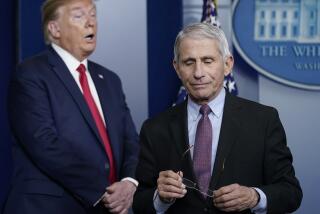Bridge to Cuba
- Share via
When a hoary foreign policy like Washington’s economic embargo of Cuba stymies developments that could help sick Americans, then surely the time has come to review its status and cast a cold eye on the political clout of the anti-Castro machine in Congress.
The issue this time turns on a breakthrough in arresting an epidemic of deadly group B meningitis, a medical achievement of Cuba’s very active and underrated medical research community. That development has value for victims anywhere, and Smith-Kline Beecham, a pharmaceutical giant, has asked the Clinton administration to waive the no-trade embargo to permit trials of the Cuban-made vaccine, which has virtually wiped out group B meningitis on the island nation.
Washington imposed the embargo after Fidel Castro came to power and declared the island a Communist state, becoming a spearhead for Soviet Communism in the Americas. The trade ban may have made sense four decades ago, when a strong Cuba could present a threat. Those were the years when the island joined an avant-garde of leftist-led nations dedicated to world power.
That power was never achieved. Cuba was smothered by the embargo and forced by the collapse of the Soviet bloc to fend for itself. The island’s remarkable medical developments grew out of an imposed self-reliance. Its scientists have built a little known but sophisticated biotechnology field, a success that has now drawn the attention of industry leaders.
What it would take for a transfer of this science is a breach in the embargo, and that decision lies in Washington. The Treasury Department, which handles the licensing parts of the embargo, could issue a waiver granting Smith-Kline authorization to proceed. In Miami, the heart of anti-Castro politics in America, a waiver would be vigorously opposed as a dangerous crack in the wall around Cuba. But whatever the opposition, such an opening will eventually come anyway.
Whether it’s research to combat skin disease or prevent meningitis and cholera, Cuban doctors and scientists have excelled in a system far less structured than America’s. U.S. companies have been prevented from exploiting Cuban breakthroughs by the Helms-Burton law, which was pushed through by the Cuban American lobby.
The Treasury Department should issue a waiver to allow Smith-Kline to test the vaccine. A humanitarian bridge can be constructed on this development. With Castroism likely to pass with its founder, Washington should give hard thought to building a new foundation for connections. What better opportunity than this?
More to Read
Sign up for Essential California
The most important California stories and recommendations in your inbox every morning.
You may occasionally receive promotional content from the Los Angeles Times.













